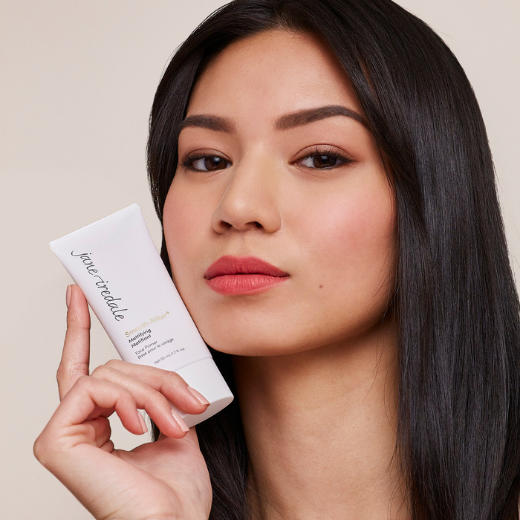Skin Care and Makeup: Making the Complicated Relationship Work
Posted by Nikki Wisher on Jan 16th 2024
It’s a Saturday night and you’re getting ready for a night out. You’ve got your favorite energizing music flowing, you have all your makeup laid out and ready to go, and you’re hyped up to look amazing and feel even better. But when you get done with your makeup, it’s not looking as polished and blended as you had envisioned, and that can take some wind out of your sails.
We’ve all been there, but it’s not inevitable in the glam life. Actually, there’s a good chance it has to do with your skin care because your skin care and your makeup have a mutually complicated relationship. Let’s give that relationship some talk therapy and figure out how to make it work better.
How Does Your Skin Care Affect Your Makeup?
As cheesy as it might sound, your skin is the canvas for the artwork that is your makeup. Just like a painter invests in quality canvases to lay the foundation for a great work of art, your makeup needs you to do the same for your skin. Your complexion affects how your makeup settles on your skin – for example, a rough or flaky complexion will make your foundation look less smooth and refined.
In a similar vein, the better your skin care is, the fewer issues you might need to cover up with your makeup. Blemishes, dark circles under your eyes, brown spots – makeup can help you camouflage these features if you choose, but if you can minimize those issues in the first place with better skin care, your makeup will have an easier job.

How Does Your Makeup Affect Your Skin Care?
As much as your skin care impacts how your makeup looks, the opposite is true too – your makeup affects your skin health and the way you care for your skin. Some makeup can irritate your skin and cause inflammation that you then need to minimize with soothing skin care products. Some makeup can also disrupt your skin’s natural moisture balance. For example, mattifying makeup can overdry your skin, creating a need for more hydrating skin care.
At the end of the day, the high point to remember is this: your skin is a complex ecosystem that needs balance and harmony among its elements, and anything that touches your skin will affect that ecosystem. That includes makeup, even though it’s meant to be purely cosmetic.
How to Make Your Skin Care and Makeup a Team
How do you know if your skin care and makeup aren’t getting along? That could be the problem if you’re seeing these signs:
- Your makeup pills up or otherwise doesn’t have a smooth look on your skin
- Your skin has frequent irritation and inflammation that is worse after you’ve been wearing makeup
- It feels like it takes too much makeup to get the application to look the way you want
If your skin care and makeup aren’t working as a team, it’s time for a little intervention. Try these changes to get them working like a cohesive team.
Choose Makeup Suited to Your Skin Type
When you’re shopping for skin care products, it’s probably a no-brainer that you need to look for products that are suited to your skin type. But most people don’t realize that your skin type affects what makeup products you should buy too. This is particularly true for products like foundation and concealer because they touch more of your skin than, say, blush, highlighter, or a brow pencil.
Some makeup products have notes about the skin types they work well for, but not all of them do. As a general rule, mattifying products will dry your skin while limiting your skin’s shininess. That makes them great for oily skin but not so great for dry skin. If you have sensitive skin, look for foundation that’s sensitive skin-friendly.

Moisturize Before Applying Makeup
This has become an essential step for my arid skin, so to my fellow dry skin girlies: this is a must! Before you start applying your makeup, hydrate your skin. You could use a light moisturizer, a hydrating serum, or a hydrating primer. Give it a couple of minutes to sink into your skin while you gather your makeup products or pull your outfit out of the closet, then start your makeup.
If you’re applying makeup in the morning, it might naturally follow your morning skin care routine so you may be freshly moisturized already. But in cases when you’re applying your makeup later in the day, adding a quick dose of hydration will give your skin a smoother, plumper finish so your makeup lays better. Plus, that hydration strengthens your skin’s protective barrier so your makeup will have less of an impact on your skin health. That’s particularly handy if you have sensitivity like most of us with dry skin.
Protect Your Skin from Makeup-Linked Bacteria
As I mentioned above, your makeup looks better when your skin beneath it is in better shape. While proper skin care is essential to minimize blemishes and other cosmetic issues that can affect your makeup look, your makeup could also be affecting your skin health by introducing bacteria to your skin.
Bacteria can grow in makeup products after they’ve degraded past their recommended shelf life, so toss out any makeup that’s expired. Bacteria also grow on makeup brushes that aren’t cleaned often enough, so make a habit of cleaning your makeup brushes every two weeks or so. Otherwise, bacteria can lead to new pimples and irritation, or in rare cases, it could even cause a serious infection.
Pair the Right Ingredients Together
For your makeup and skin care products to work in harmony, their ingredients need to get along. You might be surprised how often they’re working against each other without your knowledge.
One of the top culprits is silicone. Silicone is an ingredient in some moisturizers or primers because it sits on top of your skin to create a smooth finish. As great as that is, most concealers and foundations are made to sit on skin, not silicone. If you use a silicone-based moisturizer or primer, choose a foundation that’s silicone-based rather than water-based or oil-based.
Similarly, oil-based and water-based makeup products don’t always play nicely together. If you have an oil-based concealer you love, wear it with an oil-based foundation (or pair your water-based foundation with water-based concealer).
Creating Teamwork Between Your Skin Care and Makeup
We all want to look our best, and sometimes makeup artistry is just the thing to bring out your glamorous side. Just make sure you’re setting up your skin care and makeup to work together with the tips above and you’ll be ready to turn heads any day!


